A Comprehensive Report on George Orwell's The Road to Wigan Pier
VerifiedAdded on 2023/01/13
|9
|3187
|44
Report
AI Summary
This report examines George Orwell's 'The Road to Wigan Pier,' a book published in 1937 that offers a critical analysis of the social and economic conditions in Northern England before World War II. The report is divided into chapters that cover the book's introduction, the author's background, the historical context, methodologies used by Orwell, and a summary of the book's contents. The report analyzes the living conditions of the working class, including the impact of unemployment, poverty, and the rise of socialism. It also explores Orwell's perspectives on social issues, class divisions, and political ideologies. The report highlights Orwell's use of observation and interview methods in his research and concludes with a discussion of the book's legacy and its lasting impact on social commentary and literature.

REPORT
Paraphrase This Document
Need a fresh take? Get an instant paraphrase of this document with our AI Paraphraser
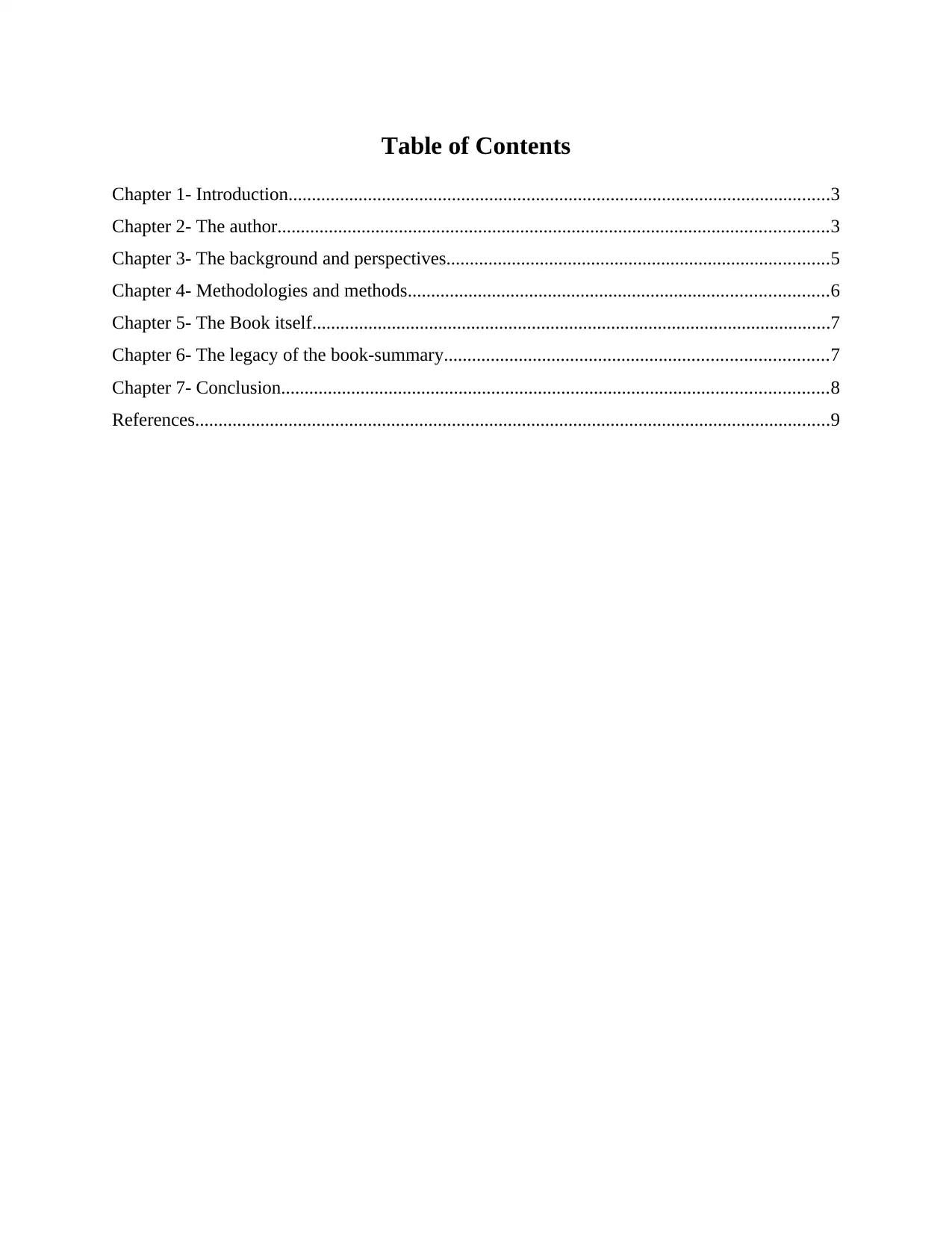
Table of Contents
Chapter 1- Introduction....................................................................................................................3
Chapter 2- The author......................................................................................................................3
Chapter 3- The background and perspectives..................................................................................5
Chapter 4- Methodologies and methods..........................................................................................6
Chapter 5- The Book itself...............................................................................................................7
Chapter 6- The legacy of the book-summary..................................................................................7
Chapter 7- Conclusion.....................................................................................................................8
References........................................................................................................................................9
Chapter 1- Introduction....................................................................................................................3
Chapter 2- The author......................................................................................................................3
Chapter 3- The background and perspectives..................................................................................5
Chapter 4- Methodologies and methods..........................................................................................6
Chapter 5- The Book itself...............................................................................................................7
Chapter 6- The legacy of the book-summary..................................................................................7
Chapter 7- Conclusion.....................................................................................................................8
References........................................................................................................................................9
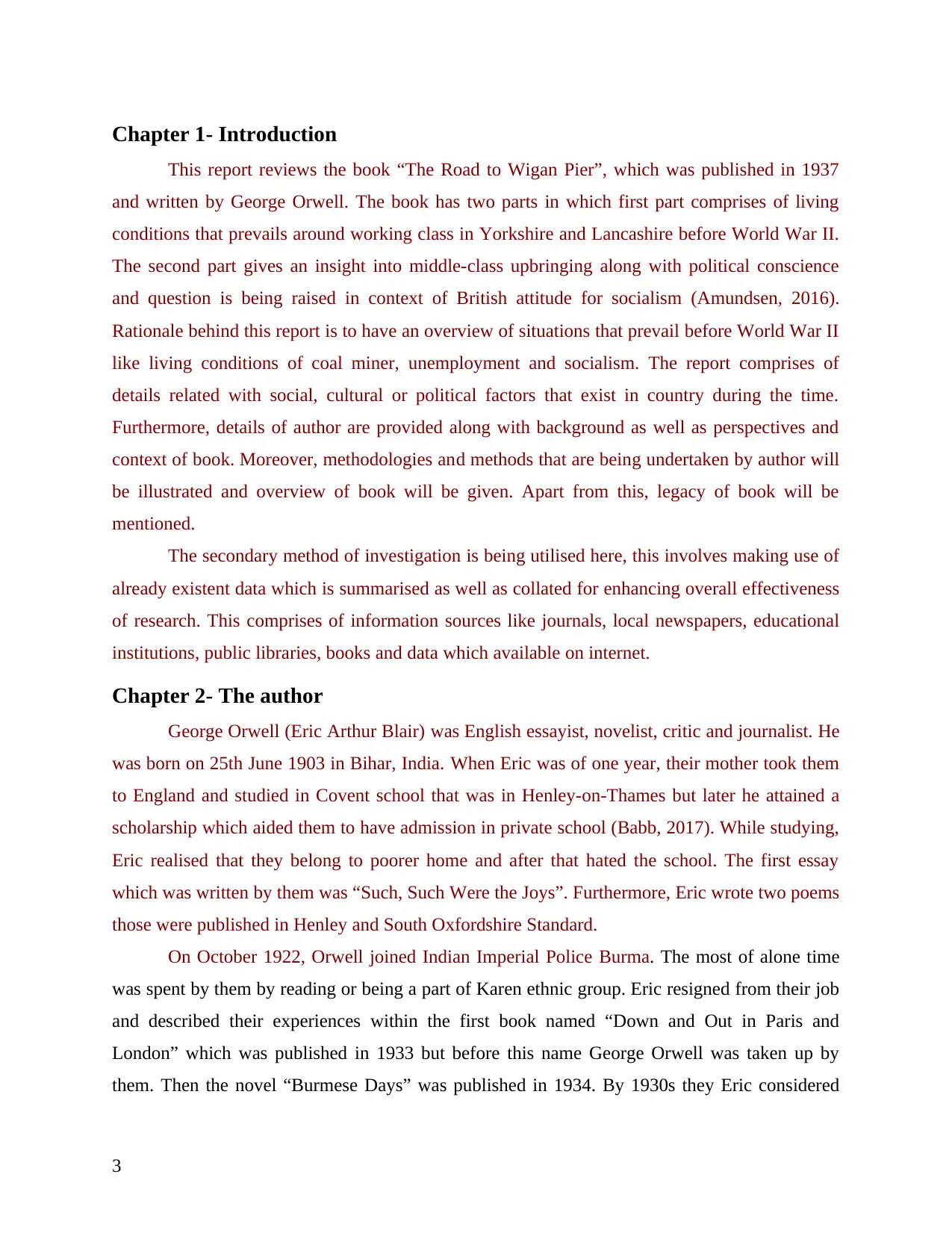
Chapter 1- Introduction
This report reviews the book “The Road to Wigan Pier”, which was published in 1937
and written by George Orwell. The book has two parts in which first part comprises of living
conditions that prevails around working class in Yorkshire and Lancashire before World War II.
The second part gives an insight into middle-class upbringing along with political conscience
and question is being raised in context of British attitude for socialism (Amundsen, 2016).
Rationale behind this report is to have an overview of situations that prevail before World War II
like living conditions of coal miner, unemployment and socialism. The report comprises of
details related with social, cultural or political factors that exist in country during the time.
Furthermore, details of author are provided along with background as well as perspectives and
context of book. Moreover, methodologies and methods that are being undertaken by author will
be illustrated and overview of book will be given. Apart from this, legacy of book will be
mentioned.
The secondary method of investigation is being utilised here, this involves making use of
already existent data which is summarised as well as collated for enhancing overall effectiveness
of research. This comprises of information sources like journals, local newspapers, educational
institutions, public libraries, books and data which available on internet.
Chapter 2- The author
George Orwell (Eric Arthur Blair) was English essayist, novelist, critic and journalist. He
was born on 25th June 1903 in Bihar, India. When Eric was of one year, their mother took them
to England and studied in Covent school that was in Henley-on-Thames but later he attained a
scholarship which aided them to have admission in private school (Babb, 2017). While studying,
Eric realised that they belong to poorer home and after that hated the school. The first essay
which was written by them was “Such, Such Were the Joys”. Furthermore, Eric wrote two poems
those were published in Henley and South Oxfordshire Standard.
On October 1922, Orwell joined Indian Imperial Police Burma. The most of alone time
was spent by them by reading or being a part of Karen ethnic group. Eric resigned from their job
and described their experiences within the first book named “Down and Out in Paris and
London” which was published in 1933 but before this name George Orwell was taken up by
them. Then the novel “Burmese Days” was published in 1934. By 1930s they Eric considered
3
This report reviews the book “The Road to Wigan Pier”, which was published in 1937
and written by George Orwell. The book has two parts in which first part comprises of living
conditions that prevails around working class in Yorkshire and Lancashire before World War II.
The second part gives an insight into middle-class upbringing along with political conscience
and question is being raised in context of British attitude for socialism (Amundsen, 2016).
Rationale behind this report is to have an overview of situations that prevail before World War II
like living conditions of coal miner, unemployment and socialism. The report comprises of
details related with social, cultural or political factors that exist in country during the time.
Furthermore, details of author are provided along with background as well as perspectives and
context of book. Moreover, methodologies and methods that are being undertaken by author will
be illustrated and overview of book will be given. Apart from this, legacy of book will be
mentioned.
The secondary method of investigation is being utilised here, this involves making use of
already existent data which is summarised as well as collated for enhancing overall effectiveness
of research. This comprises of information sources like journals, local newspapers, educational
institutions, public libraries, books and data which available on internet.
Chapter 2- The author
George Orwell (Eric Arthur Blair) was English essayist, novelist, critic and journalist. He
was born on 25th June 1903 in Bihar, India. When Eric was of one year, their mother took them
to England and studied in Covent school that was in Henley-on-Thames but later he attained a
scholarship which aided them to have admission in private school (Babb, 2017). While studying,
Eric realised that they belong to poorer home and after that hated the school. The first essay
which was written by them was “Such, Such Were the Joys”. Furthermore, Eric wrote two poems
those were published in Henley and South Oxfordshire Standard.
On October 1922, Orwell joined Indian Imperial Police Burma. The most of alone time
was spent by them by reading or being a part of Karen ethnic group. Eric resigned from their job
and described their experiences within the first book named “Down and Out in Paris and
London” which was published in 1933 but before this name George Orwell was taken up by
them. Then the novel “Burmese Days” was published in 1934. By 1930s they Eric considered
3
⊘ This is a preview!⊘
Do you want full access?
Subscribe today to unlock all pages.

Trusted by 1+ million students worldwide
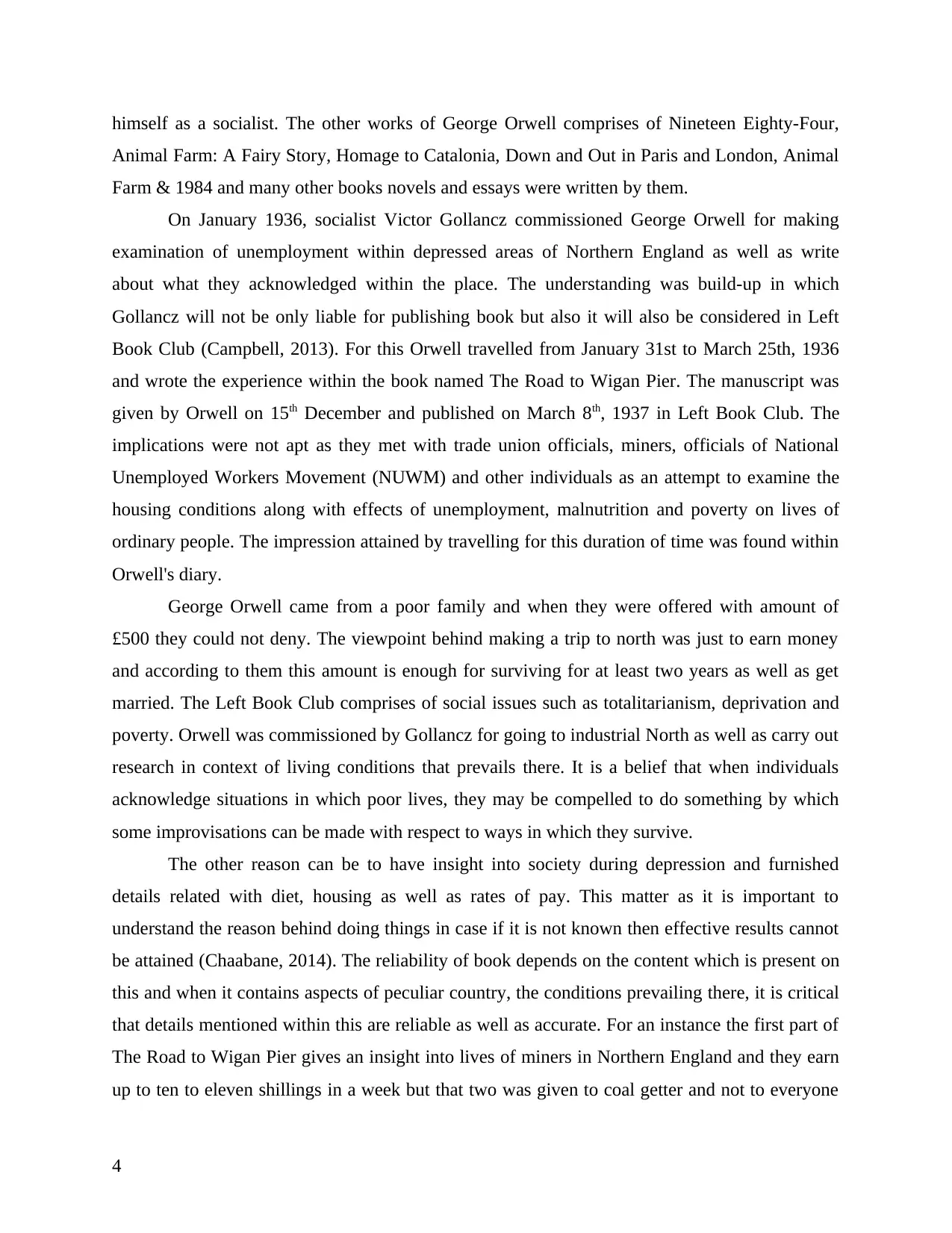
himself as a socialist. The other works of George Orwell comprises of Nineteen Eighty-Four,
Animal Farm: A Fairy Story, Homage to Catalonia, Down and Out in Paris and London, Animal
Farm & 1984 and many other books novels and essays were written by them.
On January 1936, socialist Victor Gollancz commissioned George Orwell for making
examination of unemployment within depressed areas of Northern England as well as write
about what they acknowledged within the place. The understanding was build-up in which
Gollancz will not be only liable for publishing book but also it will also be considered in Left
Book Club (Campbell, 2013). For this Orwell travelled from January 31st to March 25th, 1936
and wrote the experience within the book named The Road to Wigan Pier. The manuscript was
given by Orwell on 15th December and published on March 8th, 1937 in Left Book Club. The
implications were not apt as they met with trade union officials, miners, officials of National
Unemployed Workers Movement (NUWM) and other individuals as an attempt to examine the
housing conditions along with effects of unemployment, malnutrition and poverty on lives of
ordinary people. The impression attained by travelling for this duration of time was found within
Orwell's diary.
George Orwell came from a poor family and when they were offered with amount of
£500 they could not deny. The viewpoint behind making a trip to north was just to earn money
and according to them this amount is enough for surviving for at least two years as well as get
married. The Left Book Club comprises of social issues such as totalitarianism, deprivation and
poverty. Orwell was commissioned by Gollancz for going to industrial North as well as carry out
research in context of living conditions that prevails there. It is a belief that when individuals
acknowledge situations in which poor lives, they may be compelled to do something by which
some improvisations can be made with respect to ways in which they survive.
The other reason can be to have insight into society during depression and furnished
details related with diet, housing as well as rates of pay. This matter as it is important to
understand the reason behind doing things in case if it is not known then effective results cannot
be attained (Chaabane, 2014). The reliability of book depends on the content which is present on
this and when it contains aspects of peculiar country, the conditions prevailing there, it is critical
that details mentioned within this are reliable as well as accurate. For an instance the first part of
The Road to Wigan Pier gives an insight into lives of miners in Northern England and they earn
up to ten to eleven shillings in a week but that two was given to coal getter and not to everyone
4
Animal Farm: A Fairy Story, Homage to Catalonia, Down and Out in Paris and London, Animal
Farm & 1984 and many other books novels and essays were written by them.
On January 1936, socialist Victor Gollancz commissioned George Orwell for making
examination of unemployment within depressed areas of Northern England as well as write
about what they acknowledged within the place. The understanding was build-up in which
Gollancz will not be only liable for publishing book but also it will also be considered in Left
Book Club (Campbell, 2013). For this Orwell travelled from January 31st to March 25th, 1936
and wrote the experience within the book named The Road to Wigan Pier. The manuscript was
given by Orwell on 15th December and published on March 8th, 1937 in Left Book Club. The
implications were not apt as they met with trade union officials, miners, officials of National
Unemployed Workers Movement (NUWM) and other individuals as an attempt to examine the
housing conditions along with effects of unemployment, malnutrition and poverty on lives of
ordinary people. The impression attained by travelling for this duration of time was found within
Orwell's diary.
George Orwell came from a poor family and when they were offered with amount of
£500 they could not deny. The viewpoint behind making a trip to north was just to earn money
and according to them this amount is enough for surviving for at least two years as well as get
married. The Left Book Club comprises of social issues such as totalitarianism, deprivation and
poverty. Orwell was commissioned by Gollancz for going to industrial North as well as carry out
research in context of living conditions that prevails there. It is a belief that when individuals
acknowledge situations in which poor lives, they may be compelled to do something by which
some improvisations can be made with respect to ways in which they survive.
The other reason can be to have insight into society during depression and furnished
details related with diet, housing as well as rates of pay. This matter as it is important to
understand the reason behind doing things in case if it is not known then effective results cannot
be attained (Chaabane, 2014). The reliability of book depends on the content which is present on
this and when it contains aspects of peculiar country, the conditions prevailing there, it is critical
that details mentioned within this are reliable as well as accurate. For an instance the first part of
The Road to Wigan Pier gives an insight into lives of miners in Northern England and they earn
up to ten to eleven shillings in a week but that two was given to coal getter and not to everyone
4
Paraphrase This Document
Need a fresh take? Get an instant paraphrase of this document with our AI Paraphraser
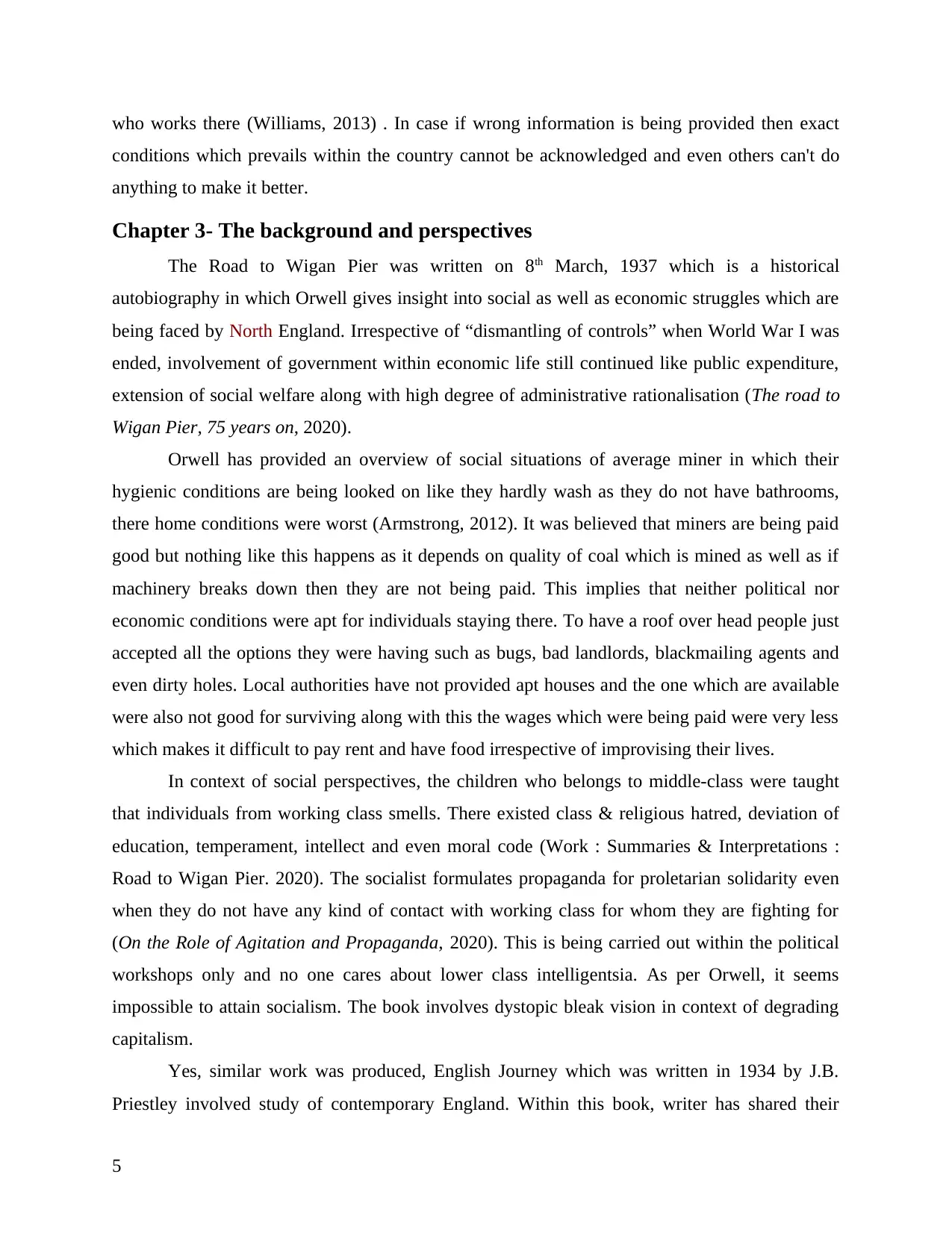
who works there (Williams, 2013) . In case if wrong information is being provided then exact
conditions which prevails within the country cannot be acknowledged and even others can't do
anything to make it better.
Chapter 3- The background and perspectives
The Road to Wigan Pier was written on 8th March, 1937 which is a historical
autobiography in which Orwell gives insight into social as well as economic struggles which are
being faced by North England. Irrespective of “dismantling of controls” when World War I was
ended, involvement of government within economic life still continued like public expenditure,
extension of social welfare along with high degree of administrative rationalisation (The road to
Wigan Pier, 75 years on, 2020).
Orwell has provided an overview of social situations of average miner in which their
hygienic conditions are being looked on like they hardly wash as they do not have bathrooms,
there home conditions were worst (Armstrong, 2012). It was believed that miners are being paid
good but nothing like this happens as it depends on quality of coal which is mined as well as if
machinery breaks down then they are not being paid. This implies that neither political nor
economic conditions were apt for individuals staying there. To have a roof over head people just
accepted all the options they were having such as bugs, bad landlords, blackmailing agents and
even dirty holes. Local authorities have not provided apt houses and the one which are available
were also not good for surviving along with this the wages which were being paid were very less
which makes it difficult to pay rent and have food irrespective of improvising their lives.
In context of social perspectives, the children who belongs to middle-class were taught
that individuals from working class smells. There existed class & religious hatred, deviation of
education, temperament, intellect and even moral code (Work : Summaries & Interpretations :
Road to Wigan Pier. 2020). The socialist formulates propaganda for proletarian solidarity even
when they do not have any kind of contact with working class for whom they are fighting for
(On the Role of Agitation and Propaganda, 2020). This is being carried out within the political
workshops only and no one cares about lower class intelligentsia. As per Orwell, it seems
impossible to attain socialism. The book involves dystopic bleak vision in context of degrading
capitalism.
Yes, similar work was produced, English Journey which was written in 1934 by J.B.
Priestley involved study of contemporary England. Within this book, writer has shared their
5
conditions which prevails within the country cannot be acknowledged and even others can't do
anything to make it better.
Chapter 3- The background and perspectives
The Road to Wigan Pier was written on 8th March, 1937 which is a historical
autobiography in which Orwell gives insight into social as well as economic struggles which are
being faced by North England. Irrespective of “dismantling of controls” when World War I was
ended, involvement of government within economic life still continued like public expenditure,
extension of social welfare along with high degree of administrative rationalisation (The road to
Wigan Pier, 75 years on, 2020).
Orwell has provided an overview of social situations of average miner in which their
hygienic conditions are being looked on like they hardly wash as they do not have bathrooms,
there home conditions were worst (Armstrong, 2012). It was believed that miners are being paid
good but nothing like this happens as it depends on quality of coal which is mined as well as if
machinery breaks down then they are not being paid. This implies that neither political nor
economic conditions were apt for individuals staying there. To have a roof over head people just
accepted all the options they were having such as bugs, bad landlords, blackmailing agents and
even dirty holes. Local authorities have not provided apt houses and the one which are available
were also not good for surviving along with this the wages which were being paid were very less
which makes it difficult to pay rent and have food irrespective of improvising their lives.
In context of social perspectives, the children who belongs to middle-class were taught
that individuals from working class smells. There existed class & religious hatred, deviation of
education, temperament, intellect and even moral code (Work : Summaries & Interpretations :
Road to Wigan Pier. 2020). The socialist formulates propaganda for proletarian solidarity even
when they do not have any kind of contact with working class for whom they are fighting for
(On the Role of Agitation and Propaganda, 2020). This is being carried out within the political
workshops only and no one cares about lower class intelligentsia. As per Orwell, it seems
impossible to attain socialism. The book involves dystopic bleak vision in context of degrading
capitalism.
Yes, similar work was produced, English Journey which was written in 1934 by J.B.
Priestley involved study of contemporary England. Within this book, writer has shared their
5
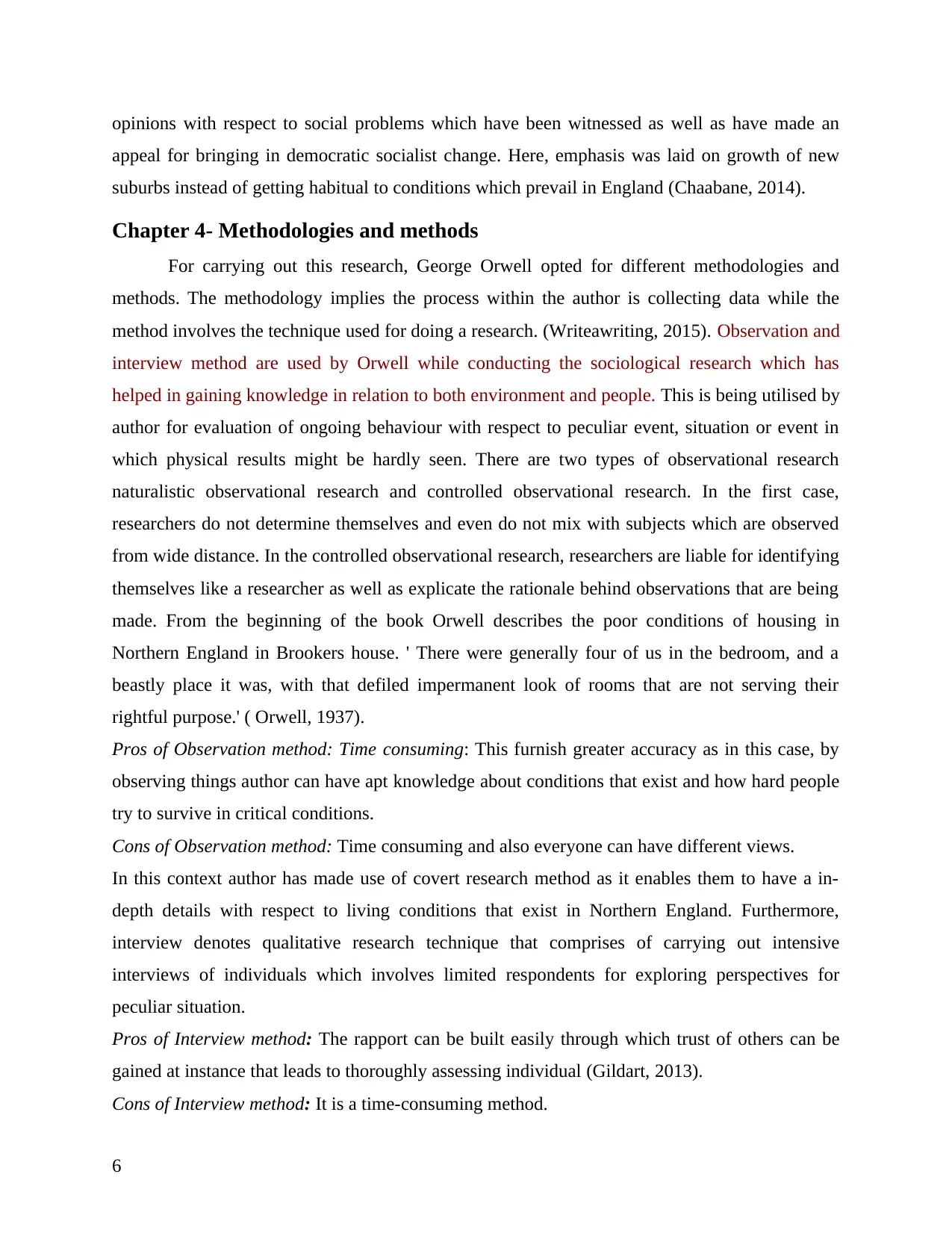
opinions with respect to social problems which have been witnessed as well as have made an
appeal for bringing in democratic socialist change. Here, emphasis was laid on growth of new
suburbs instead of getting habitual to conditions which prevail in England (Chaabane, 2014).
Chapter 4- Methodologies and methods
For carrying out this research, George Orwell opted for different methodologies and
methods. The methodology implies the process within the author is collecting data while the
method involves the technique used for doing a research. (Writeawriting, 2015). Observation and
interview method are used by Orwell while conducting the sociological research which has
helped in gaining knowledge in relation to both environment and people. This is being utilised by
author for evaluation of ongoing behaviour with respect to peculiar event, situation or event in
which physical results might be hardly seen. There are two types of observational research
naturalistic observational research and controlled observational research. In the first case,
researchers do not determine themselves and even do not mix with subjects which are observed
from wide distance. In the controlled observational research, researchers are liable for identifying
themselves like a researcher as well as explicate the rationale behind observations that are being
made. From the beginning of the book Orwell describes the poor conditions of housing in
Northern England in Brookers house. ' There were generally four of us in the bedroom, and a
beastly place it was, with that defiled impermanent look of rooms that are not serving their
rightful purpose.' ( Orwell, 1937).
Pros of Observation method: Time consuming: This furnish greater accuracy as in this case, by
observing things author can have apt knowledge about conditions that exist and how hard people
try to survive in critical conditions.
Cons of Observation method: Time consuming and also everyone can have different views.
In this context author has made use of covert research method as it enables them to have a in-
depth details with respect to living conditions that exist in Northern England. Furthermore,
interview denotes qualitative research technique that comprises of carrying out intensive
interviews of individuals which involves limited respondents for exploring perspectives for
peculiar situation.
Pros of Interview method: The rapport can be built easily through which trust of others can be
gained at instance that leads to thoroughly assessing individual (Gildart, 2013).
Cons of Interview method: It is a time-consuming method.
6
appeal for bringing in democratic socialist change. Here, emphasis was laid on growth of new
suburbs instead of getting habitual to conditions which prevail in England (Chaabane, 2014).
Chapter 4- Methodologies and methods
For carrying out this research, George Orwell opted for different methodologies and
methods. The methodology implies the process within the author is collecting data while the
method involves the technique used for doing a research. (Writeawriting, 2015). Observation and
interview method are used by Orwell while conducting the sociological research which has
helped in gaining knowledge in relation to both environment and people. This is being utilised by
author for evaluation of ongoing behaviour with respect to peculiar event, situation or event in
which physical results might be hardly seen. There are two types of observational research
naturalistic observational research and controlled observational research. In the first case,
researchers do not determine themselves and even do not mix with subjects which are observed
from wide distance. In the controlled observational research, researchers are liable for identifying
themselves like a researcher as well as explicate the rationale behind observations that are being
made. From the beginning of the book Orwell describes the poor conditions of housing in
Northern England in Brookers house. ' There were generally four of us in the bedroom, and a
beastly place it was, with that defiled impermanent look of rooms that are not serving their
rightful purpose.' ( Orwell, 1937).
Pros of Observation method: Time consuming: This furnish greater accuracy as in this case, by
observing things author can have apt knowledge about conditions that exist and how hard people
try to survive in critical conditions.
Cons of Observation method: Time consuming and also everyone can have different views.
In this context author has made use of covert research method as it enables them to have a in-
depth details with respect to living conditions that exist in Northern England. Furthermore,
interview denotes qualitative research technique that comprises of carrying out intensive
interviews of individuals which involves limited respondents for exploring perspectives for
peculiar situation.
Pros of Interview method: The rapport can be built easily through which trust of others can be
gained at instance that leads to thoroughly assessing individual (Gildart, 2013).
Cons of Interview method: It is a time-consuming method.
6
⊘ This is a preview!⊘
Do you want full access?
Subscribe today to unlock all pages.

Trusted by 1+ million students worldwide
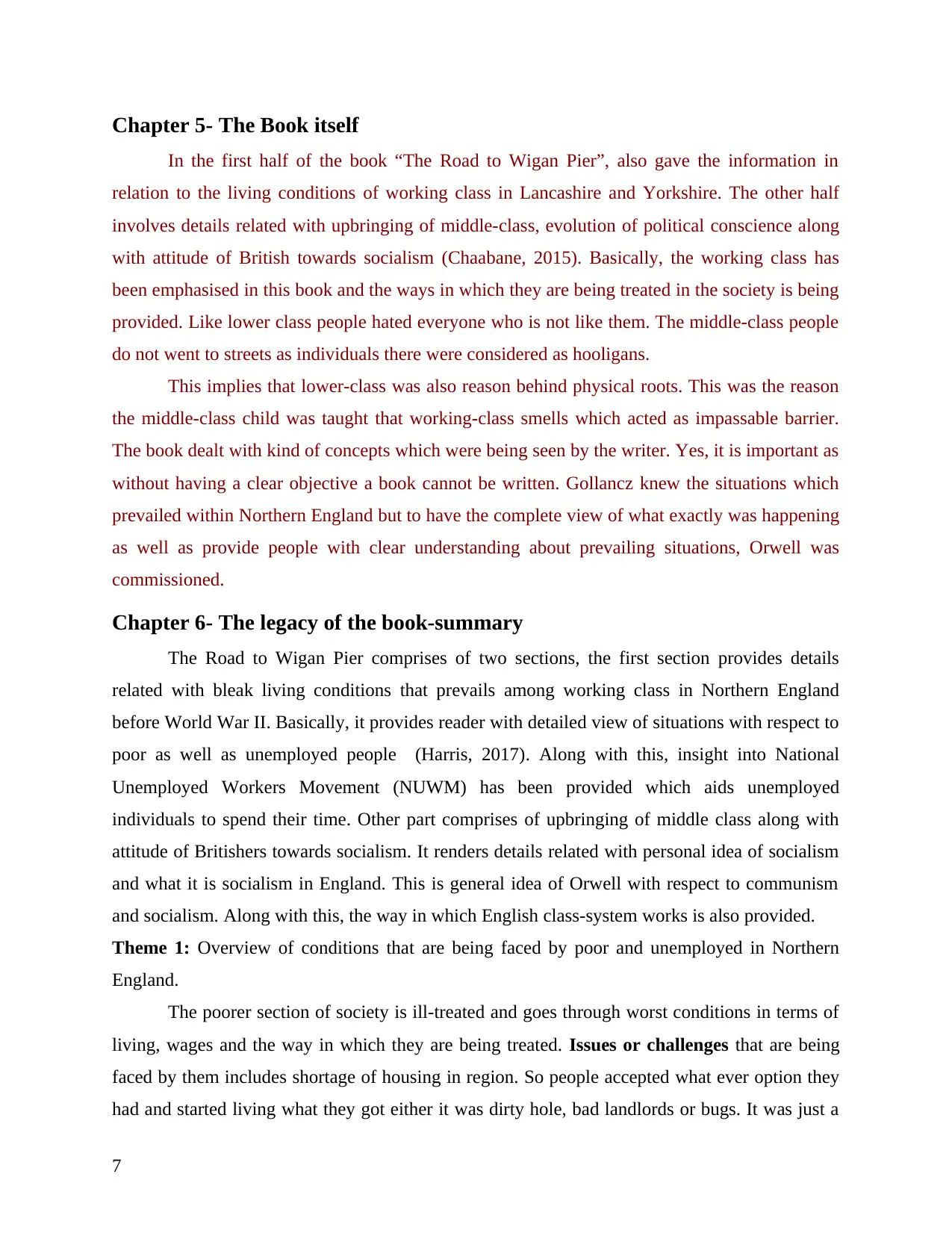
Chapter 5- The Book itself
In the first half of the book “The Road to Wigan Pier”, also gave the information in
relation to the living conditions of working class in Lancashire and Yorkshire. The other half
involves details related with upbringing of middle-class, evolution of political conscience along
with attitude of British towards socialism (Chaabane, 2015). Basically, the working class has
been emphasised in this book and the ways in which they are being treated in the society is being
provided. Like lower class people hated everyone who is not like them. The middle-class people
do not went to streets as individuals there were considered as hooligans.
This implies that lower-class was also reason behind physical roots. This was the reason
the middle-class child was taught that working-class smells which acted as impassable barrier.
The book dealt with kind of concepts which were being seen by the writer. Yes, it is important as
without having a clear objective a book cannot be written. Gollancz knew the situations which
prevailed within Northern England but to have the complete view of what exactly was happening
as well as provide people with clear understanding about prevailing situations, Orwell was
commissioned.
Chapter 6- The legacy of the book-summary
The Road to Wigan Pier comprises of two sections, the first section provides details
related with bleak living conditions that prevails among working class in Northern England
before World War II. Basically, it provides reader with detailed view of situations with respect to
poor as well as unemployed people (Harris, 2017). Along with this, insight into National
Unemployed Workers Movement (NUWM) has been provided which aids unemployed
individuals to spend their time. Other part comprises of upbringing of middle class along with
attitude of Britishers towards socialism. It renders details related with personal idea of socialism
and what it is socialism in England. This is general idea of Orwell with respect to communism
and socialism. Along with this, the way in which English class-system works is also provided.
Theme 1: Overview of conditions that are being faced by poor and unemployed in Northern
England.
The poorer section of society is ill-treated and goes through worst conditions in terms of
living, wages and the way in which they are being treated. Issues or challenges that are being
faced by them includes shortage of housing in region. So people accepted what ever option they
had and started living what they got either it was dirty hole, bad landlords or bugs. It was just a
7
In the first half of the book “The Road to Wigan Pier”, also gave the information in
relation to the living conditions of working class in Lancashire and Yorkshire. The other half
involves details related with upbringing of middle-class, evolution of political conscience along
with attitude of British towards socialism (Chaabane, 2015). Basically, the working class has
been emphasised in this book and the ways in which they are being treated in the society is being
provided. Like lower class people hated everyone who is not like them. The middle-class people
do not went to streets as individuals there were considered as hooligans.
This implies that lower-class was also reason behind physical roots. This was the reason
the middle-class child was taught that working-class smells which acted as impassable barrier.
The book dealt with kind of concepts which were being seen by the writer. Yes, it is important as
without having a clear objective a book cannot be written. Gollancz knew the situations which
prevailed within Northern England but to have the complete view of what exactly was happening
as well as provide people with clear understanding about prevailing situations, Orwell was
commissioned.
Chapter 6- The legacy of the book-summary
The Road to Wigan Pier comprises of two sections, the first section provides details
related with bleak living conditions that prevails among working class in Northern England
before World War II. Basically, it provides reader with detailed view of situations with respect to
poor as well as unemployed people (Harris, 2017). Along with this, insight into National
Unemployed Workers Movement (NUWM) has been provided which aids unemployed
individuals to spend their time. Other part comprises of upbringing of middle class along with
attitude of Britishers towards socialism. It renders details related with personal idea of socialism
and what it is socialism in England. This is general idea of Orwell with respect to communism
and socialism. Along with this, the way in which English class-system works is also provided.
Theme 1: Overview of conditions that are being faced by poor and unemployed in Northern
England.
The poorer section of society is ill-treated and goes through worst conditions in terms of
living, wages and the way in which they are being treated. Issues or challenges that are being
faced by them includes shortage of housing in region. So people accepted what ever option they
had and started living what they got either it was dirty hole, bad landlords or bugs. It was just a
7
Paraphrase This Document
Need a fresh take? Get an instant paraphrase of this document with our AI Paraphraser
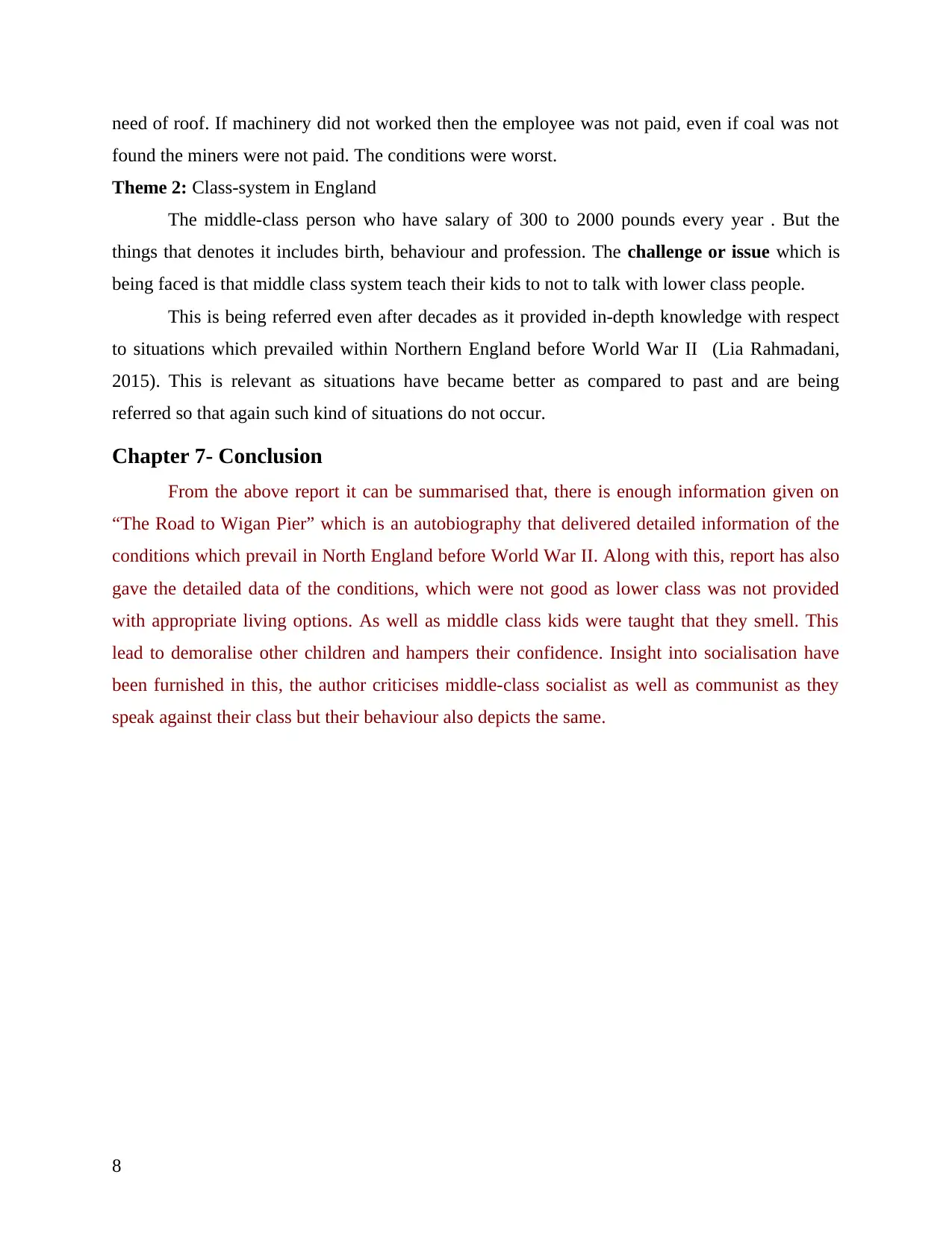
need of roof. If machinery did not worked then the employee was not paid, even if coal was not
found the miners were not paid. The conditions were worst.
Theme 2: Class-system in England
The middle-class person who have salary of 300 to 2000 pounds every year . But the
things that denotes it includes birth, behaviour and profession. The challenge or issue which is
being faced is that middle class system teach their kids to not to talk with lower class people.
This is being referred even after decades as it provided in-depth knowledge with respect
to situations which prevailed within Northern England before World War II (Lia Rahmadani,
2015). This is relevant as situations have became better as compared to past and are being
referred so that again such kind of situations do not occur.
Chapter 7- Conclusion
From the above report it can be summarised that, there is enough information given on
“The Road to Wigan Pier” which is an autobiography that delivered detailed information of the
conditions which prevail in North England before World War II. Along with this, report has also
gave the detailed data of the conditions, which were not good as lower class was not provided
with appropriate living options. As well as middle class kids were taught that they smell. This
lead to demoralise other children and hampers their confidence. Insight into socialisation have
been furnished in this, the author criticises middle-class socialist as well as communist as they
speak against their class but their behaviour also depicts the same.
8
found the miners were not paid. The conditions were worst.
Theme 2: Class-system in England
The middle-class person who have salary of 300 to 2000 pounds every year . But the
things that denotes it includes birth, behaviour and profession. The challenge or issue which is
being faced is that middle class system teach their kids to not to talk with lower class people.
This is being referred even after decades as it provided in-depth knowledge with respect
to situations which prevailed within Northern England before World War II (Lia Rahmadani,
2015). This is relevant as situations have became better as compared to past and are being
referred so that again such kind of situations do not occur.
Chapter 7- Conclusion
From the above report it can be summarised that, there is enough information given on
“The Road to Wigan Pier” which is an autobiography that delivered detailed information of the
conditions which prevail in North England before World War II. Along with this, report has also
gave the detailed data of the conditions, which were not good as lower class was not provided
with appropriate living options. As well as middle class kids were taught that they smell. This
lead to demoralise other children and hampers their confidence. Insight into socialisation have
been furnished in this, the author criticises middle-class socialist as well as communist as they
speak against their class but their behaviour also depicts the same.
8
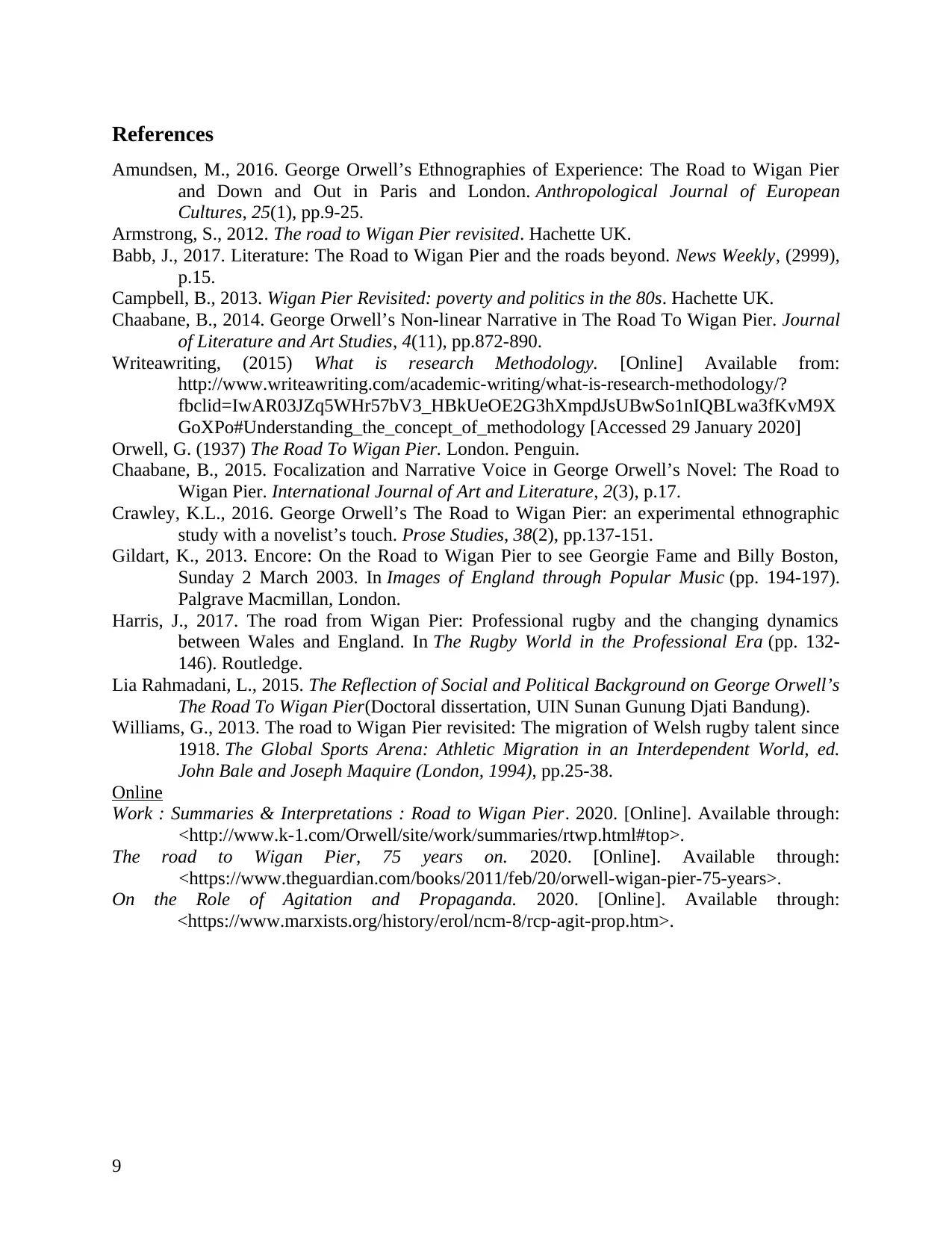
References
Amundsen, M., 2016. George Orwell’s Ethnographies of Experience: The Road to Wigan Pier
and Down and Out in Paris and London. Anthropological Journal of European
Cultures, 25(1), pp.9-25.
Armstrong, S., 2012. The road to Wigan Pier revisited. Hachette UK.
Babb, J., 2017. Literature: The Road to Wigan Pier and the roads beyond. News Weekly, (2999),
p.15.
Campbell, B., 2013. Wigan Pier Revisited: poverty and politics in the 80s. Hachette UK.
Chaabane, B., 2014. George Orwell’s Non-linear Narrative in The Road To Wigan Pier. Journal
of Literature and Art Studies, 4(11), pp.872-890.
Writeawriting, (2015) What is research Methodology. [Online] Available from:
http://www.writeawriting.com/academic-writing/what-is-research-methodology/?
fbclid=IwAR03JZq5WHr57bV3_HBkUeOE2G3hXmpdJsUBwSo1nIQBLwa3fKvM9X
GoXPo#Understanding_the_concept_of_methodology [Accessed 29 January 2020]
Orwell, G. (1937) The Road To Wigan Pier. London. Penguin.
Chaabane, B., 2015. Focalization and Narrative Voice in George Orwell’s Novel: The Road to
Wigan Pier. International Journal of Art and Literature, 2(3), p.17.
Crawley, K.L., 2016. George Orwell’s The Road to Wigan Pier: an experimental ethnographic
study with a novelist’s touch. Prose Studies, 38(2), pp.137-151.
Gildart, K., 2013. Encore: On the Road to Wigan Pier to see Georgie Fame and Billy Boston,
Sunday 2 March 2003. In Images of England through Popular Music (pp. 194-197).
Palgrave Macmillan, London.
Harris, J., 2017. The road from Wigan Pier: Professional rugby and the changing dynamics
between Wales and England. In The Rugby World in the Professional Era (pp. 132-
146). Routledge.
Lia Rahmadani, L., 2015. The Reflection of Social and Political Background on George Orwell’s
The Road To Wigan Pier(Doctoral dissertation, UIN Sunan Gunung Djati Bandung).
Williams, G., 2013. The road to Wigan Pier revisited: The migration of Welsh rugby talent since
1918. The Global Sports Arena: Athletic Migration in an Interdependent World, ed.
John Bale and Joseph Maquire (London, 1994), pp.25-38.
Online
Work : Summaries & Interpretations : Road to Wigan Pier. 2020. [Online]. Available through:
<http://www.k-1.com/Orwell/site/work/summaries/rtwp.html#top>.
The road to Wigan Pier, 75 years on. 2020. [Online]. Available through:
<https://www.theguardian.com/books/2011/feb/20/orwell-wigan-pier-75-years>.
On the Role of Agitation and Propaganda. 2020. [Online]. Available through:
<https://www.marxists.org/history/erol/ncm-8/rcp-agit-prop.htm>.
9
Amundsen, M., 2016. George Orwell’s Ethnographies of Experience: The Road to Wigan Pier
and Down and Out in Paris and London. Anthropological Journal of European
Cultures, 25(1), pp.9-25.
Armstrong, S., 2012. The road to Wigan Pier revisited. Hachette UK.
Babb, J., 2017. Literature: The Road to Wigan Pier and the roads beyond. News Weekly, (2999),
p.15.
Campbell, B., 2013. Wigan Pier Revisited: poverty and politics in the 80s. Hachette UK.
Chaabane, B., 2014. George Orwell’s Non-linear Narrative in The Road To Wigan Pier. Journal
of Literature and Art Studies, 4(11), pp.872-890.
Writeawriting, (2015) What is research Methodology. [Online] Available from:
http://www.writeawriting.com/academic-writing/what-is-research-methodology/?
fbclid=IwAR03JZq5WHr57bV3_HBkUeOE2G3hXmpdJsUBwSo1nIQBLwa3fKvM9X
GoXPo#Understanding_the_concept_of_methodology [Accessed 29 January 2020]
Orwell, G. (1937) The Road To Wigan Pier. London. Penguin.
Chaabane, B., 2015. Focalization and Narrative Voice in George Orwell’s Novel: The Road to
Wigan Pier. International Journal of Art and Literature, 2(3), p.17.
Crawley, K.L., 2016. George Orwell’s The Road to Wigan Pier: an experimental ethnographic
study with a novelist’s touch. Prose Studies, 38(2), pp.137-151.
Gildart, K., 2013. Encore: On the Road to Wigan Pier to see Georgie Fame and Billy Boston,
Sunday 2 March 2003. In Images of England through Popular Music (pp. 194-197).
Palgrave Macmillan, London.
Harris, J., 2017. The road from Wigan Pier: Professional rugby and the changing dynamics
between Wales and England. In The Rugby World in the Professional Era (pp. 132-
146). Routledge.
Lia Rahmadani, L., 2015. The Reflection of Social and Political Background on George Orwell’s
The Road To Wigan Pier(Doctoral dissertation, UIN Sunan Gunung Djati Bandung).
Williams, G., 2013. The road to Wigan Pier revisited: The migration of Welsh rugby talent since
1918. The Global Sports Arena: Athletic Migration in an Interdependent World, ed.
John Bale and Joseph Maquire (London, 1994), pp.25-38.
Online
Work : Summaries & Interpretations : Road to Wigan Pier. 2020. [Online]. Available through:
<http://www.k-1.com/Orwell/site/work/summaries/rtwp.html#top>.
The road to Wigan Pier, 75 years on. 2020. [Online]. Available through:
<https://www.theguardian.com/books/2011/feb/20/orwell-wigan-pier-75-years>.
On the Role of Agitation and Propaganda. 2020. [Online]. Available through:
<https://www.marxists.org/history/erol/ncm-8/rcp-agit-prop.htm>.
9
⊘ This is a preview!⊘
Do you want full access?
Subscribe today to unlock all pages.

Trusted by 1+ million students worldwide
1 out of 9
Related Documents
Your All-in-One AI-Powered Toolkit for Academic Success.
+13062052269
info@desklib.com
Available 24*7 on WhatsApp / Email
![[object Object]](/_next/static/media/star-bottom.7253800d.svg)
Unlock your academic potential
Copyright © 2020–2025 A2Z Services. All Rights Reserved. Developed and managed by ZUCOL.




